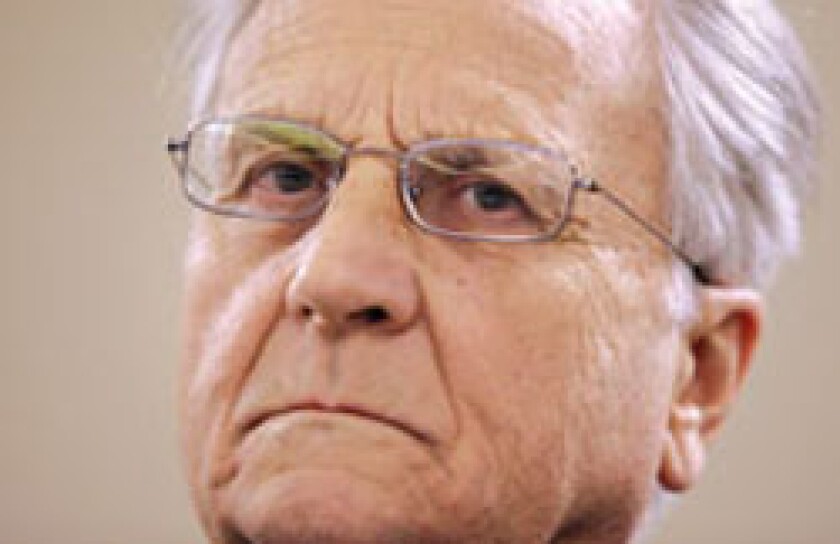If a week is a long time in politics, this year has been an eternity in central banking. Since the start of 2010, the European Central Bank (ECB) has intervened in markets, seen the first bailout of a eurozone member state, and extended the emergency measures put in place to deal with the biggest financial crisis since the Great Depression. Venerable peers such as the Federal Reserve and the Bank of England have been shaken by the impact; the learning curve of the ECB, one of the youngest global financial institutions, has been vertical.
In late 2009, all eyes were on the bank’s exit strategy from the emergency measures put in place to help stabilize the global financial system. These included lending banks unlimited cash for up to one year, buying covered bonds – while avoiding buying government paper outright as the Fed and Bank of England had done with their quantitative easing programmes – and dropping its benchmark interest rate to a record low of 1%.
“The main challenge for the ECB is to tailor the exit from its accommodative monetary policy stance in an environment of prevailing uncertainty,” Jürgen Stark, member of the Executive Board of the ECB tells Emerging Markets. “We must be sure that the actions taken to tackle the crisis do not sow the seeds of new imbalances or excesses. Thus, the ECB’s key interest rates and overall provision of liquidity will be adjusted timely and appropriately.”

In May, the ECB took an active role in the EU rescue package for Greece by launching the Securities Markets Programme, which would buy euro area debt securities to reinvigorate what it called “dysfunctional markets”. The decision was seen as a reversal of the ECB’s earlier policy, with Bundesbank president Axel Weber saying in newspaper Boersen-Zeitung that, “The purchase of government bonds poses significant stability risks.”
Still, by mid-September the ECB had spent just over E61 billion, without providing details of what it had bought, though economists say it has mainly been sovereign paper in Greece, Portugal and Ireland.
“It was a very important decision,” says Laurent Bilke, global head of inflation strategy at Nomura and a former ECB economist. “The European governments and the IMF will provide the medium- and long-term response, but the ECB’s intervention was instrumental in ensuring that the market took these important policy steps in the right way.”
Still, the balancing act between Germany’s fear of inflation on the one hand, and on the other, not crushing peripheral countries as they implement strict austerity packages is an extremely sensitive one. While the rhetoric about a break-up has calmed, and ECB president Jean-Claude Trichet repeats that a Greek eurozone departure is “absurd hypothesis”, the sovereign debt crisis has been the currency bloc’s most testing time yet – and there’s no guarantee it’s over.
BUSINESS AS USUAL?
Dealing with the crisis took the ECB into uncharted territory. However, board members constantly stressed that using these new tools never conflicted with its objective of keeping inflation rates below, but close to, 2% over the medium term. With annual HICP (Harmonized Index of Consumer Prices) inflation expectations revised slightly upwards in the bank’s September forecast to between 1.2% and 2.2% for 2011, there’s no chance of the bank losing focus.
“The ECB made an important step in September when it said risks to the outlook for price developments are slightly tilted to the upside, a phrase they haven’t used since 2008,” says Bilke. “They are back to the business of monitoring inflation.”
Still, while rising global commodity prices and indirect tax hikes by governments seeking to consolidate shaky fiscal positions may give hawks plenty to worry about, the ECB inhabits a fundamentally different universe from the pre-crisis era. In May, it extended a change to the rules for the collateral it accepts so that Greek government paper would remain eligible, even if the country were downgraded again. Likewise, Trichet said in September it will maintain fixed-rate full allotment for its one-month tenders “for as long as necessary”.
“The process of the exit from the eurosystem’s non-standard measures, or their phasing out as we like to call it, will need to be gradual given the uncertainty surrounding the evolution of economic and financial market conditions,” Stark says. “These measures have been enacted during the period of acute financial market tensions to ensure a better transmission of our monetary policy to the economy. However, we made clear from the very beginning that by construction, they would be temporary in nature and fully in line with our price stability objective.”
Some emergency measures have ended – the one-year and six-month tenders which provided unlimited liquidity to banks have been phased out, with demand diminishing in the last operations, although the exceptional six-month tender on May 12 shows it can reintroduce them at any time. Still, the ECB is walking a tightrope in terms of strategy over the coming year, as it weighs up when to exit the measures and whether to do this before or after raising the benchmark rate.
ALL CHANGE
On top of facing unprecedented policy challenges, the bank is facing big changes, with Trichet’s term as president ending in October 2011 and executive board member Gertrude Tumpel-Gugerell due to step down in May. “We can only presume that if the presidency has to go to a current governor of a big national central bank, then the head of the German Bundesbank would be a very strong candidate,” says Bilke. “There are a lot of unwritten rules, and we don’t know how strong they are because the ECB has very little history.”
EU finance ministers will take the decision on both posts in the coming months. In Weber’s favour, there is a strong feeling it is Germany’s turn for the top job, especially as it didn’t get one of the more powerful roles in the latest reshuffle of the European Commission. However, his recent comments foreshadowing governing council meetings, and the brouhaha surrounding Bundesbank board member Thilo Sarrazin’s book about immigration may have harmed his chances, and Mario Draghi, head of Banca d’Italia, has been mooted as a strong alternative candidate.
Another hurdle may be the EU Parliament, who heard candidates for the first time when Portugal’s Vitor Constancio was selected as vice-president earlier this year. “The Parliament would like to hear candidates again,” says MEP Sharon Bowles. “We hadn’t liked the way when possibly it’s been a little bit predictable about who was going to come because it’s been the turn of such and such a country.”
Whoever gets the jobs, the chemistry of the ECB board will have to adjust, especially with Estonia’s Andres Lipstok joining the governing council from January when the Baltic country becomes the eurozone’s 17th member. Moreover, it needs to do all this while changing management and negotiating a European political and economic landscape that is moving closer to fiscal unity.
“Even if they didn’t say it, governments have made a step towards fiscal consolidation and to a large extent the EFSF was basically telling you they accept the idea of some bailout, if needs be,” Bilke says. “When we look back at what happened in the past year I terms of policy reaction in Europe, we will see that this was a very important moment.”
CRUCIAL TIME
Next year promises to be crucial for the ECB. It needs to balance the strategy implications of an uneven global recovery with the gradual exit from emergency measures, while also carrying out its main job of containing inflation.
“The credibility earned during these years contributes to the strong anchoring of inflation expectations in the euro area, including in crisis times,” Stark says. “Credibility is a priceless asset, and I can assure you that looking forward we will continue to pursue our mandate staunchly.”
